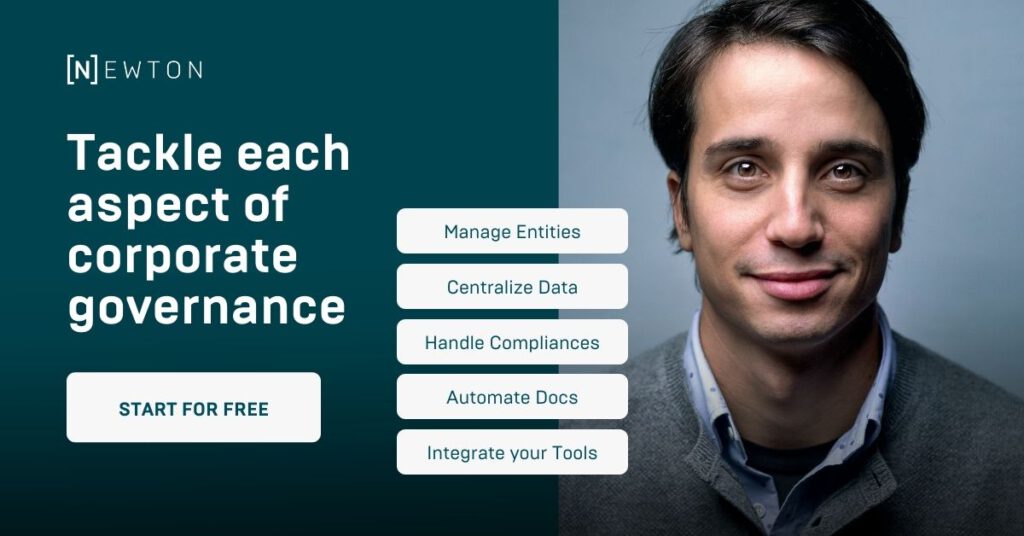
How to implement digitalization, service delivery, collaboration, business strategy, and business culture to avoid silos.
Dear Legal Ops!
Welcome to “Let’s Talk About Legal Ops” — a series by NEWTON exploring the evolving role of legal operations in modern organizations.
From legal entity management and document oversight to cross-functional collaboration, we share practical insights for legal teams navigating complex environments.
Looking for more? Browse our blog for posts on strategy, structure, new features, and practical tips.
- NEWTON 2025 Recap: A Year of Growth and Innovation
- How to Set Default Filters in NEWTON for Faster Access
- How to Copy Entity Data from NEWTON into Emails or Documents
Get the Latest NEWTON News
Don’t miss out on the latest NEWTON features, updates, and improvements. Subscribe to our newsletter and stay informed about everything NEWTON—new tools, enhanced functionality, and fixes that make compliance management easier for your business!
For companies to survive in today’s volatile economy and grow revenue, cross-silo collaboration is essential. But performance management systems discourage it. More than 8,000 senior managers across biotech, banking, consumer products, energy, and law are found to be affected by siloed performance targets.
Most companies incentivize employees to maximize short-term results, making them focus on reaching their numbers at the cost of losing sight of the organization’s larger goals. Despite this, legal operations continue to succeed.
The main reason, more companies realize how beneficial legal operations can be to their legal department and overall company. Across the globe, companies create efficient legal departments and optimize workflows every day.
This article offers tips on managing legal operations and ensuring the entire organization benefits successfully.
Legal Operations – What Does That Mean?
Legal operations ensure that the firm offers legal services efficiently and profitably to stimulate the legal departments’ growth and performance. It also involves running a law firm’s business side, which includes;
- Increasing company productivity
- Reducing/avoiding risks
- Compliance monitoring
- Handling departmental budgets
- Implementing new technologies
- Using legal analytics tools to analyze data
- Third-party provider sourcing and management
Achieving operational excellence often involves focusing efforts on specific departments or teams and implementing strategies accordingly.
Any activity that keeps a business running falls under the category of operations. Aside from the items above, several departments and processes support them, such as:
- Sales
- IT
- Facilities management
- HR
- Finance
- Marketing
Organize Your Company to Avoid Silos Work
Divergent goals of different units of an organization can result in silos of work. In addition to being an obstacle to collaboration and leading to decreased performance, silos also make it difficult for customers to have a positive experience.
Using customer knowledge is the best way to make decisions. But due to time pressure and lack of information, business decisions are often based on assumptions. Often, information is needed to reinforce an existing conclusion or speed up a current procedure.
Unfortunately, most companies have silos with a limited understanding of their customers instead of sharing the same knowledge across teams and adding information specific to that team. In the customer’s eyes, these silos manifest as communication breakdowns, contradictory information, poor service, or other forms of negativity.
Ultimately, success in today’s marketplace reflects the culture you promote, so it is extremely important to align your strategy accordingly.
To facilitate collaboration across departments, here are a few practical tips:
Aligning Cross-Functional Operations with Legal Operations
A successful digital transformation requires cross-functional collaboration. Why? Because the success of a business depends on all departments working together in symbiosis to maximize revenue.
A strong partnership with the legal department, specifically legal operations, is beneficial to the overall health and success of the company. Due to social and economic factors, organizations are re-imagining legacy technologies and processes to collaborate remotely.
Across businesses, legal ops teams have been formed as a strategic priority to ensure cross-functional alignment. In addition to compliance and risk management, legal operations are the glue that holds together the legal function and touches every department in the organization.
The legal role in a business evolves, and so must its relationships. Below are a few ways legal ops can align with other business departments.
Every Department Can Benefit from Legal as a Strategic Partner
The legal department often acts as a cost center in less innovative firms and dictates contract terms within a silo. In a 2018 study on contract management, 87% of employees said legal reviews could take up to six weeks. Often, legal is blamed for the prolonged sales cycle and bottlenecks across departments.
But a more efficient communication system, processes, and technology can help the legal department leverage its strategic positioning within a company. The legal department can lead the charge by creating best practices:
- For cross-functional communication
- Advocating easy information exchange
- Making sure documents are accessible when needed
By doing so, each department and the company can run more efficiently. Moreover, businesses can thrive internally and externally by streamlining cross-functional processes and maintaining healthy workplace relationships.
Incorporating Technology into Your Business
Tech tools help encourage cross-departmental operational team collaboration in the legal department. Despite not having the biggest tech stack, legal can benefit from investment in tools that:
- Manage vendor relationships
- Reduce outside counsel spending
- Manage online contracts
With digital contracting and contract management, legal ops can better understand all contracts without micromanaging their execution. These tools allow them to embark on cross-functional initiatives impacting the business significantly.
Exchange of Knowledge
Since Legal works with every department, they must provide new and innovative information-sharing methods. Legal is often the company’s compliance expert (unless there is a separate compliance department) and provides guidelines for operating with less risk for the rest of the company.
Strategic planning can benefit more than just legal ops. In this case, you might need to procure a tool with the following:
- A robust reporting system that is accessible by all departments
- Stores and tracks all contracts in one place
- Provides other departments with the necessary data
Developing Standard agreements
Aside from providing strategic business input, the legal department also oversees contracting. Yet contracts tend to take up the majority of their time, which leaves the Legal department with little time to focus on:
- On higher-value agreements, when drafting new terms for low-value contracts
- Reviewing vendor and sales agreements before they are sent out
- And keeping track of versions and updates for existing online agreements
However, legal ops can better organize contracts by differentiating between standardized and personalized contracts and identifying which ones to focus on. They can create pre-approved terms for other departments to add to or remove from agreements they’re negotiating and redlining, such as M&A deals.
This allows them time to negotiate and redline high-value contracts.
Developing a Strategy
A siloed legal operations department cannot form a strategy. Legal ops and in-house must be fully aware of the company’s goals and strategic initiatives and how their role contributes to them.
It is more effective for legal to collaborate with other departments in developing a strategy that aligns with and supports the goals of the individual departments and the company. Changing simple processes like contract management can improve cross-functional alignment with legal and legal operations.
It is possible to streamline legal processes and enhance the relationship between legal and other departments by implementing legal technology like digital contracting.
Making Technology Work for You
Technology is king in professional services today. Besides measuring operational efficiency, it also frees up your team from a lot of administrative work and adds intelligence to the process.
Using color-coded antiquated spreadsheets as a unified source of truth will only cause more inaccurate data across project management, legal operations, and finance.
Team members are often forced to fill out unnecessary spreadsheets used only for payroll. This slows down teams. For resource management or time registration, for example, spreadsheets or disparate systems won’t be able to move data efficiently simply because they’re not designed for this.
Let’s examine spreadsheets for a moment. Are they capable of providing answers to questions like
- Is the project currently on track?
- Is there an operating margin?
- Is the project profitable?
Get the Latest NEWTON News
Don’t miss out on the latest NEWTON features, updates, and improvements. Subscribe to our newsletter and stay informed about everything NEWTON—new tools, enhanced functionality, and fixes that make compliance management easier for your business!
Spreadsheets are not the answer
They can’t be since spreadsheets can only automate a few things. Thus, if a spreadsheet is a barrier to getting your work done or tackling the core issue quickly, you should consider another way to improve your personal KPIs.
It can be challenging to track how the numbers relate to the actual operation, even after gathering the numbers. Essentially, each operation becomes a black box: inputs go in, outputs come out, and little attention is paid to how the transformation works.
This is an obvious disadvantage of using point solutions from different vendors or, more importantly, the lack of connectivity between them. To avoid this outcome, service businesses have begun to use centralized software.
Additionally, it’s always challenging to keep separate spreadsheets updated for management problems. People forget to fill them out or do not have the time to do so. There is often no way to know how the changes you make might impact the work of several others.
Software Can Help You Make the Digital Transition
An organization seeking to expand during the digital age must have an entity management system. Companies need a solution that simplifies all compliance aspects to navigate compliance and grow effectively.
With NEWTON’s corporate services offerings, your organization will benefit from a full-service team of professionals dedicated to simplifying your business processes and enhancing your growth.
You no longer need to worry about locating compliance documents, ensuring departments work together, or hiring an internal team as you grow. With a full range of corporate services and entity management solutions, we’re here to help. Find out how NEWTON can help your business today.

About this article
Sources
Harvard Business Review (2022). Performance Management Shouldn’t Kill Collaboration
StartMyLLC (2023). Contract Management Statistics 2023 – Everything You Need to Know
Forecast app (2021). How to Improve Operational Efficiency: A Start-to-Finish Guide
CLOC (2019). What Is Legal Operations?
BCD.CA. MakingTechnology Work for Your Business – A Guide for Entrepreneurs
Asana (2022). 6 ways digital transformation can improve your business
Images
Featured Image: Photo by Tim van der Kuip on Unsplash
Featured CTA blog post: Photo by Jurica Koletić on Unsplash / Photo by Christina @ wocintechchat.com on Unsplash